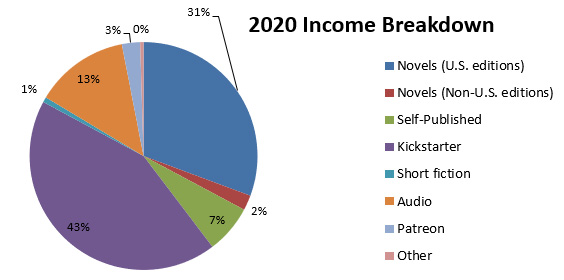2020 Writing Income
::Peeks out from beneath my Protective Blanket of Fear::
Is 2020 gone yet? (Yes, I know “2020” is an arbitrary construct, and the troubles of the past year aren’t going to magically disappear, but I’m using the new year as a psychological Cure Psychic Wounds potion to give me a boost for the coming months.)
Anyway, for thirteen years now, I’ve done a write-up about my income as a SF/F author. Money is often a taboo subject in the writing field, and the common belief is that “successful” writers are Stephen King levels of wealthy, and the rest are poor enough to be Dickens characters.
I’m just one data point. I doubt there’s any such thing as a typical writer or a typical writing career. But I figure one data point is still better than none, right?
Without further ado, let’s talk numbers.
Prior Years: Here are the annual write-ups going back to 2007: 2007, 2008, 2009, 2010, 2011, 2012, 2013, 2014, 2015, 2017, 2018, 2019.
In 2016, instead of a personal income write-up, I did a survey of almost 400 novelists about their income.
My Background: I’m a primarily “traditionally published,” U.S.-based SF/F author with 14 books in print from major New York publishers. The first of those books came out from DAW in 2006. I’ve also sold about 50 short stories. I’ve never hit the NYT or USA Today bestseller lists, but my last five books have been lead titles for my publisher. In late 2015, I mostly-quit my full-time day job, switching to 10-15 hours/week for the State of Michigan, and spending the rest of my time writing and as stay-at-home Dad.
In December 2018, my wife was diagnosed with an aggressive form of lymphoma. She fought hard for nine months, but died in August of 2019. This devastated pretty much every aspect of my life, including my writing.
Because writers also need to consider insurance and benefits, I’ll note how fortunate we were that I’d kept that part-time day job, which included a continuation of my health insurance. The original plan had been to switch over to my wife’s insurance through her work … which would have ended in early 2019, leaving us with much higher medical bills.
2020 in Summary: I mean, 2020 sucked for pretty much everyone, yeah? I struggled pretty hard finding the energy and motivation to write. I generally like to write hopeful, fun stories, and let’s just say the past year was not a hopeful, fun mood.
That said, I was able to finish Terminal Peace, the third and final Janitors of the Post-Apocalypse book. My editor hasn’t gotten back to me yet about revisions on that, which means I haven’t received the deliverance portion of that advance.
I did, however, get paid the final chunk of my advance for Terminal Uprising when the paperback came out at the start of 2020.
The other big project for 2020 was a Kickstarter for my middle-grade fantasy Tamora Carter: Goblin Queen. That brought in around $14,000 … most of which went right back into actually producing the finished book.
All total, before taxes or expenses or Kickstarter costs (but after agent commissions), I made $31,411.26 as an author in 2020. Not my best year, but far better than 2019.
 I consider myself a relatively successful writer, overall. But as you can see, success isn’t exactly a linear thing…
I consider myself a relatively successful writer, overall. But as you can see, success isn’t exactly a linear thing…
It looks like I had about $7500 worth of expenses this year, almost all of which were Kickstarter-related. (I’ll be finding a few more expenses once I work on my taxes, so that number will go up a bit.) And there were close to $3000 in estimated quarterly tax payments.
2020 Breakdown: The two big sources of income were the publication payment for the Terminal Uprising paperback and the Kickstarter for Tamora Carter: Goblin Queen. Income that was directly from the Kickstarter has its own category. Sales of the book after the Kickstarter ended are bundled into the self-publishing category.
- Novels (U.S. editions): $9632.76
- Novels (Non-U.S. editions): $671.52
- Self-Published: $2157.80
- Kickstarter: $13,567.23
- Short fiction: $231.42
- Audio: $4188.91
- Patreon: $810.81
- Other: $150.81
Patreon was a new thing this year. Huge thanks to everyone who’s been supporting me there.
The audio category includes the advance for Goblin Queen to two different audio book publishers (one for an unabridged version, and one for an abridged, dramatized version).
Short fiction is for royalties on a couple of stories that are still earning their keep years later. That’s unusual, but I’ll take it!
Looking Ahead: I won’t tempt fate by making predictions about 2021, but I’m hoping to accomplish a few things, writing-wise:
- Final revisions to Terminal Peace
- Write and submit a new middle-grade fantasy
- Sell a new fantasy novel to DAW
We’ll see how it goes. Like most of us, I’d really, really love to get back to something approaching “normal,” whatever that looks like.
I hope this has been helpful. As always, please feel free to share the post and ask any questions. I’ll do my best to answer.







Vera Nazarian
January 8, 2021 @ 7:25 pm
Excellent results despite a hellish year! Hang in there Jim, and may 2021 bring the peaceful, sane, and hopeful turnaround we all need!
Hugs!
Vera
Celia Lake - The economics of writing
March 5, 2021 @ 9:13 pm
[…] Jim C. Hines has been doing breakdowns of his own income and some conversation about trends in the science fiction and fantasy community, which may give you some ideas. Here’s his 2020 writeup with a lot of context for his own numbers. […]